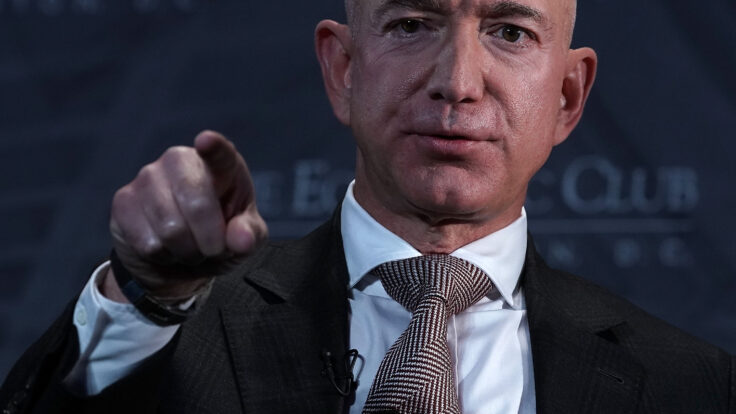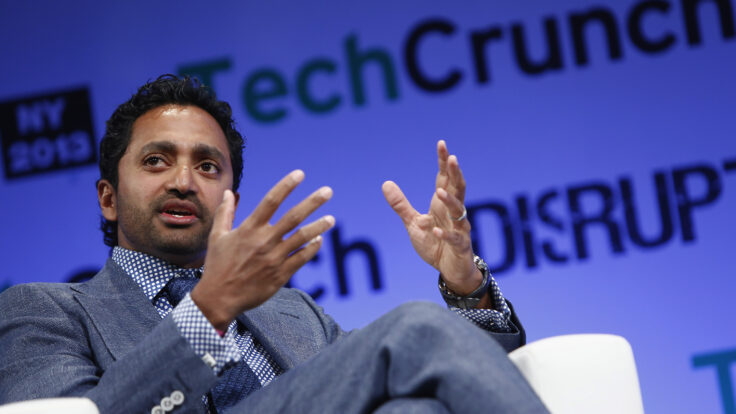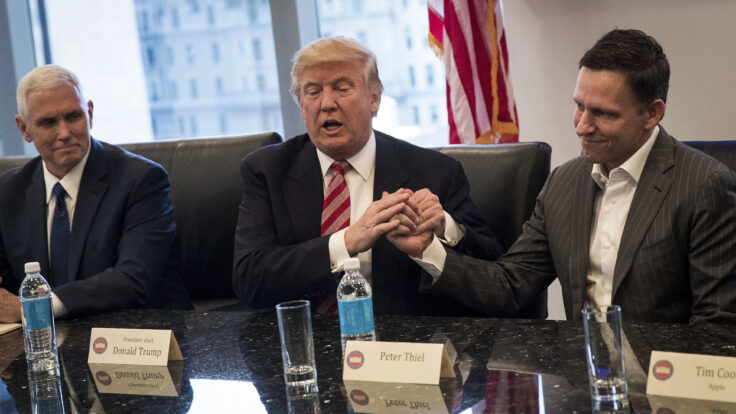|
Hey there, Teddy Schleifer here. Happy February.
If you’ve got a friend or colleague who might enjoy these weekly dispatches from Silicon Valley—or if this email was forwarded to you—we’ve now made it easier than ever to receive the trial version of The Stratosphere by entering your email right here.
In today’s email: Laurene Powell Jobs, Reid Hoffman, Peter Thiel, and everyone who’s anyone in Silicon Valley political fundraising. Your friends in Washington will get a lot of value out of this one.
SPONSORED BY
A potentially definitive, highly unscientific analysis of who has the most political juice right now in Silicon Valley. Given the truly astronomical dry powder at their disposal, and the recitations every two years that this election is the most important of our lifetimes, I’m often surprised that America’s stratospheric mega-donor class doesn’t spend more of their wealth on political campaigns. Sure, the elites of Silicon Valley, New York, and L.A. can help bundle millions for their candidates and steer their networks to their preferred causes, but we don’t see the titans of capitalism spending hundreds of millions, let alone a few billion, on each election cycle, even when you include undisclosed dark money. I get it: the return on investment is iffy. But even here in Silicon Valley, home to so many frazzled liberal billionaires determined to suffocate the existential threat of Trumpism, the checks they cut can seem half-hearted, at least when judged against the size of their stock portfolios.
Yes, we are living in an age when individual candidates can build national fandoms and low-dollar fundraising bases that can obviate the pilgrimages to the mega-donors’ chalets or casinos. But the whales still play an enormous role in underwriting the outside groups that help determine who wins and who loses. This fall, for instance, Democrats are at serious risk of losing the Senate, an outcome that would significantly abridge the Biden agenda. (Democrats are highly likely to lose control of the House.) And despite the small-donor revolution that populists like Bernie Sanders unleashed, the party’s chances of success in Senate battlegrounds like Wisconsin, Pennsylvania and Arizona depend on their donors’ willingness to engage. The same, of course, is true on the right.
Overhanging all of this is the question of whether the Democratic mega-donors who awoke to battle Trump will return in 2024. If Trump runs again, I’d bet they do. But the midterms offer a window into their appetite for combat, or whether their interest in politics was more of a fleeting passion. That’s why I have been anticipating the slew of new federal filings that were made public in the days leading up to yesterday’s deadline—disclosures that reveal the last six months of donations in 2021. These donors undoubtedly still have juice. How much juice, exactly? It can be hard to measure their influence scientifically, à la Nate Silver. After all, people do rise and fall in this world. Sean Parker and Marc Benioff used to be big players, now less so; no one heard of Sam Bankman-Fried three years ago; now he’s S.B.F.—perhaps the multi-initialed donor-world heir to the import of Laurene Powell Jobs, or L.P.J. as she’s inevitably known. So, armed with these new filings, I present a totally scientific, not-at-all shit-stirring power ranking of Silicon Valley’s top political donors, at least as of this writing.
ADVERTISEMENT Working to stop harmful content and improve our platforms every day
We’re committed to stopping illicit content and keeping you safe on Facebook. That’s why we’ve quadrupled our safety and security teams to more than 40,000 over the last five years.
But there’s more to do. See how we’re working to help you connect safely.
On the Left
9. Dustin Moskovitz: If there is one donor that I think is likeliest to fade away from Democratic big-money politics, I’d bet on Moskovitz. The former Zuckerberg roommate and Facebook co-founder, now better known as the C.E.O. of Asana, is also half of one of Silicon Valley’s philanthropic power couples, alongside his wife Cari Tuna. In 2016, the two said that they were “compelled to act” to take on Trump, but that they were doing so reluctantly, wading into the muck because of the unique threat he posed to democracy.
Moskovitz reported about $50 million spent on the 2020 election, and I’m sure the actual number is much, much higher. But Moskovitz, to me at least, has appeared somewhat uncomfortable with his new role in the Democratic Party, or at least hasn’t been sure how to firmly clutch the tiller of power to achieve his earnest policy objectives. Indeed, Moskovitz hasn’t cut a check to the Democratic Party since the 2020 campaign ended—there was nothing new from him filed this week—and I wonder if that reflects an intentional effort to get back to the bread-and-butter, experiment-heavy, partisan-free work that is more core to his charity and advocacy group, Open Philanthropy.
8. Ken Duda: I’m willing to bet you haven’t heard of this guy, the co-founder of the $40 billion software company Arista. But Democratic fundraisers have. “I would be very happy to go back to ignoring politics like I did before 2016,” he told me just before the 2020 election. “I hope to put Twitter away after this election, and my political donations will go away along with that.” It didn’t work out that way for him. Duda just dropped $500,000 into a pro-Biden super PAC, Unite the Country, and $1 million into the anti-G.O.P. group, American Bridge. Duda is a fairly private guy, and hasn’t shown interest in being a player.
7. Connie Ballmer: The wife of frenetic Clippers owner and former Microsoft C.E.O. Steve Ballmer, Connie runs the couple’s philanthropy and has increasingly become a major figure in Democratic fundraising, especially on the issue of gun-control. Her husband often takes pains to remain nonpartisan. Not so for Connie. I’m intrigued to see how much she gives this cycle; she just donated $1 million to House Majority PAC, the super PAC allied with Nancy Pelosi.
6. Laurene Powell Jobs: L.P.J. funds the waterfront of progressive groups, although she has historically been more of an advocacy donor than a candidate donor—you won’t find her cutting massive checks to super PACs, and she hasn’t made a seven-figure donation since 2016. She is advised, above all others, by Stacey Rubin, a former top Clinton administration official, along with former top Biden strategist Michael Schrum. (Former Emerson adviser Bruce Reed, meanwhile, left to go work for Biden.) Compared to the other folks on this list, L.P.J. is quite proficient at the inside game, too. After playing defense on her key issues under Trump, like immigration, L.P.J. increasingly has been leaning in during the Biden era, hiring the likes of former Rep. Joe Kennedy III to play offense in Washington. A clear win or two would move her up the rankings.
5. Sam Bankman-Fried: Perhaps the most intriguing new donor is Bankman-Fried, who burst onto the scene in the fall of 2020 with more than $5 million in contributions and whose name now comes up constantly—like L.P.J., only the initials necessary. S.B.F. has not had a donor-adviser to date (he’s told me that he was considering hiring someone), but he is well-connected in part due to his mother, Barbara Fried, who founded a popular donor-advisory group called Mind the Gap, and his brother Gabe, who works in Democratic politics. An advocate of “effective altruism,” S.B.F.’s money is increasingly littered all over the campaign-finance landscape, from the $500,000 he gave to Senate Majority PAC late last year to his support for a new super PAC backing crypto-friendly candidates. His main cause to date has been pandemic preparedness, or trying to build up America’s defenses against the next deadly disease, alongside his ideological ally, Moskovitz.
4. Ron Conway: Despite Conway’s workaholic nature and larger-than-life stature, the truth is that he is not always as big a donor as he is often made out to be in terms of total dollars (though the $450,000 he just gave to Senate Majority PAC is a nice flex). About a decade ago, Conway towered over local San Francisco politics, earning a reputation as a kingmaker, or even as a shadow puppeteer, pulling the strings behind tech-friendly mayor Ed Lee. But over the last five years or so, Conway has largely shifted his gaze to national politics—focusing above all else on gun control, and most recently on voting rights. Guided by former Pinterest general counsel Mike Yang, Conway’s real superpower is as a master organizer—he’s always circulating some petition or another—and his close relationships with people like Pelosi, whose super PAC he has now given $1.7 million this cycle. His success is a reminder that money, even in this world, isn’t enough.
3. Karla Jurvetson: The former Los Altos shrink entered the national political consciousness in early 2020 when she was revealed as the mystery patron who essentially kept Elizabeth Warren in the race with her $15 million in late-primary donations. In reality, she has been active in politics more-or-less full-time dating back to Trump’s election. Originally she was essentially a single-issue donor, primarily focusing on women’s issues and abortion rights. She has donated over $30 million to EMILY’s List—such a large sum that Stephanie Schriock has joked that it should be called KARLA’s List.
But alongside strategists like Cooper Teboe, Jurvetson has expanded her purview and for the last year or so has been one of the main Democratic donors, alongside Conway, pushing the party to take a swing on a big voting-rights bill, a lobbying campaign that obviously did not work. So she has potential juice, but has yet to post a concrete win. New filings show she put $500,000 more into House Majority PAC late last year.
2. Eric Schmidt: In a boom-and-bust world, where temperamental donors come and go, Schmidt is admired by Democrats for his reliability: He persists, cycle after cycle. Aided principally by Josh Hendler and Jason Berkenfeld, Schmidt has long had a particular focus in campaign technology and data. He helped start one of the Democratic Party’s highest-profile data shops, Civis Analytics, and more recently has played a big role in setting up STAC Labs, which offers consulting services to Democratic state parties. “The Democrats’ infrastructure is very poor,” Schmidt told me the other month. “And I’m the logical person to work on this.”
Schmidt has unmistakeable sway in Washington, particularly on A.I. and China policy, although his influence is now under much greater scrutiny than it was in the Obama administration. And yet Schmidt has a cockroach-like ability to survive and remain relevant—even during the Trump years. He’s the likeliest person on this list to still have juice in 2040.
1. Reid Hoffman: The LinkedIn founder has spent more energy (and probably more millions, easily more than $100 million) than anyone else on this list to oust Trump. He is also, inevitably, the most discussed. Hoffman, perhaps unwittingly, angered much of the traditional Democratic establishment (things eased up beginning around 2019) with his plans to upset the apple cart that was the traditional operative class and has continued to push Democrats to be more innovative and more tech-savvy.
I’ve grown tired of writing again and again about Reid, as likable as he is, but I can’t help it because he funds interesting stuff—here’s a piece about a new effort to elect more moderate candidates—and Hoffman does have unique influence, with the ability to give any group instant credibility by tossing it a few bucks. Meanwhile, Hoffman’s chief advisor, the hard-charging operative Dmitri Mehlhorn, has run a donor table that has regularly convened the party’s biggest givers. There’s been a lot of speculation and trepidation about whether Hoffman (and Melhorn) were going to retreat out of politics, but I’d argue that the tales of their exit have been greatly exaggerated. Hoffman has yet to fully open the floodgates for the 2022 cycle, but the pair will remain engaged—as evidenced by the $1.5 million that he dropped into Pelosi’s super PAC late last year. Honorable mentions: Mike Moritz, who gave $500,000 more to the embattled Lincoln Project late last year, a sign that he isn’t returning to his 2012-era level of political involvement; Chris Larsen, with his $5 million check to the Republican Jesse Sullivan for governor of Illinois, his biggest ever; Bill Gates and Melinda French Gates, who have been cutting more checks to political candidates than you may have realized; and Chris Sacca, who has been funding various political tech startups, rather than the big committees.
ADVERTISEMENT
On the Right
There is a striking lack of Republican firepower in Silicon Valley. One thing I was struck by on Monday, as I read the filings from the main two G.O.P. super PACs involved in the 2022 midterms—Kevin McCarthy’s Congressional Leadership Fund and Mitch McConnell’s Senate Leadership Fund—was just how little tech money you could find. The two organizations raised over $95 million in the second half of the year, but unlike Wall Street, Silicon Valley gave barely anything.
That financial void creates a political opportunity for technologists who want to become players. Republican fundraising in the Bay Area has historically been the domain of old-money families like the ones that produced socialite royalty Trevor Traina and Dede Wilsey. Here are the conservatives who have stepped forward to bridge that gap:
5. David Sacks: A mainstay in technology circles since his PayPal Mafia days, Sacks has emerged over the last 18 months as a major player in national politics, too, opening his Pacific Heights house for fundraisers for the likes of Ron DeSantis, Miami mayor Francis Suarez, and Ohio Senate hopeful J.D. Vance. Part of Sacks’ juice is a byproduct of his popular podcast, All In, which he co-hosts with Chamath Palihapitiya, Jason Calacanis, and David Friedberg. Sacks still hasn’t cut the yuge checks that would give him a seat at the big-boy table of G.O.P. money politics, but he is clearly increasingly interested, so who is to say he won’t? 4. Chamath Palihapitiya: Including Sacks’ co-host on the Republican side of the aisle is a bit of a troll, given that I wouldn’t describe Chamath as a Republican any more than I would describe him as “the owner” of the Warriors. (An owner, yes.) His politics are a moving target, criticizing “wokes” by day, triggering Tom Cotton with his comments about the Uighurs by night. Palihapitiya donated three-quarters of a million bucks to back Senate Democrats before 2020, but seems to be moving rightward this cycle, backing the recall of Gavin Newsom and giving $250,000 to the super PAC behind Suarez, Miami’s exuberant, business-friendly mayor.
3. Doug Leone: During the Trump era, there were few more venerated Silicon Valley names showing up on pro-Trump filings than Leone, the longtime co-leader (alongside Moritz) of Sequoia Capital, the legendary venture capital firm. That surprised me at the time given just how carefully Sequoia tends to its reputation. After January 6, Leone told me he was renouncing his support for Trump. But he is still donating to Republican groups all across the country, including $200,000 to the C.L.F., the McCarthy group, and another $200,000 to the R.N.C.
2. Larry Ellison: Back in the day, Ellison, a golfing buddy of Bill Clinton, used to be considered a Democrat. Nowadays, Ellison’s hawkishness on China and Israel has led him to become one of Silicon Valley’s most powerful Republican donors, with relatively little fanfare. He’s made his biggest bet on Tim Scott, the possible 2024 presidential candidate, putting $10 million over the last year or so into a group backing the South Carolina senator, and hosting Scott on the Hawaiian island that he basically owns. How much juice is in that Lanai pineapple? Enough that Ellison was the rare Silicon Valley titan to develop a close relationship with Trump, even hosting him for a fundraiser (one that, curiously, Ellison has claimed he didn’t personally attend it).
1. Peter Thiel: No Silicon Valley donor, of either party, has as much on the line this year as Thiel—nor is anyone else investing as much money or elbow grease in 2022. Two of Thiel’s mentees, Blake Masters and J.D. Vance, are making bids for the Republican nods for Senate in Arizona and Ohio, and Thiel is working closely with both of them, pumping $10 million into each of their super PACs. I’m sure there’s more money to come as their primary elections draw nearer, though I was intrigued to see that Thiel didn’t put any more cash into either super PAC in the second half of last year. (The Masters group did, however, receive $100,000 from the Winklevoss twins.) Honorable mentions: Don’t sleep on Kraken Exchange C.E.O. Jesse Powell, who on the weekend before the Gavin Newsom recall suddenly dropped $1 million into the effort. And speaking of trolls, Palmer Luckey, the Hawaiian-shirt donning Facebook emigre, is worth a head-nod here, too.
My Reading List…
FOUR STORIES WE’RE TALKING ABOUT Hollywood’s new definition of success in the streaming era is perhaps the most difficult and debated question of all. MATTHEW BELLONI Reading the tea leaves on the political futures of Pence, DeSantis, and Pompeo. Plus, decoding the G.O.P.’s Kid Rock fantasy. TINA NGUYEN Notes on Jack Dorsey’s successor, the stratification of digital media, and Omicron-era information overload. BARATUNDE THURSTON The inside conversation on Wall Street about Pershing’s new investment thesis, and JPMorgan in the penalty box. WILLIAM D. COHAN
You received this message because you signed up to receive emails from Puck.
Was this email forwarded to you?
Sent to
Interested in exploring our newsletter offerings?
Puck is published by Heat Media LLC.
For support, just reply to this e-mail. For brand partnerships, email ads@puck.news |
-
Join Puck
Directly Supporting Authors
A new economic model in which writers are also partners in the business.
Personalized Subscriptions
Customize your settings to receive the newsletters you want from the authors you follow.
Stay in the Know
Connect directly with Puck talent through email and exclusive events.


















